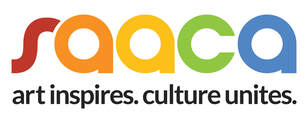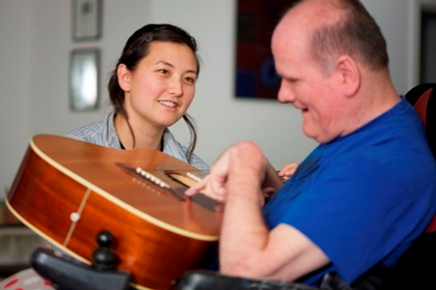Art TherapySAACA believes the Arts has an impact—physically, emotionally, economically, and educationally—on the lives of service members, Veterans, seniors, families, aging communities, healthcare providers, and the community.
The Southern Arizona Arts and Cultural Alliance partners with local artists to deliver arts therapy programs, as well as therapeutic arts classes and instruction, in a diverse multi-disciplinary approach. Facilitating the use of ground-breaking Creative Arts Therapies for seniors, Veterans, and individuals with disabilities in our community, the Creative Arts Therapies Program utilizes an integrative method to provide healing through the arts using music, writing, visual arts and community arts components. Benefits of Art Therapy While physical therapy and psychotherapy in general have many benefits, the concept of art therapy has proven to be successful in various ways that differ from traditional therapy practices. There are various uses for art therapy with regards to healing, but the benefits may surprise you if you’ve never heard of art as a form of therapy. Who Benefits from Art Therapy? Art therapy sets itself apart as a means of therapy by utilizing the creative process of art and having a low barrier to entry (anyone can be creative in some form or another). Art therapy can be especially beneficial to children as younger people are usually less capable and less comfortable expressing themselves via words. While art therapy can benefit children greatly, it can also be very helpful to adults. Really, anyone can benefit from art therapy. Even if you’re using creative arts as a means of expression without the aid of an art therapist, there are still many benefits to be had. Why Art Therapy?Art therapy is an effective treatment for people with a range of extenuating circumstances, especially those experiencing developmental, medical, educational and social or psychological impairment. Individuals who benefit from art therapy include those who have survived trauma resulting from combat, abuse and natural disaster; persons with adverse physical health conditions such as cancer, traumatic brain injury and other health disability; and persons with autism, dementia, depression and other disorders. Art therapy helps people resolve conflicts, improve interpersonal skills, manage problematic behaviors, reduce negative stress and achieve personal insight. Art therapy also provides an opportunity to enjoy the life-affirming pleasures of art making.
Today art therapy is widely practiced in a variety of settings including hospitals, psychiatric and rehabilitation facilities, wellness centers, forensic institutions, schools, crisis centers, senior communities, private practice, and other clinical and community settings. Research supports the use of art therapy within a professional relationship for the therapeutic benefits gained through artistic self-expression and reflection for individuals who experience illness, trauma and mental health problems and those seeking personal growth. |
Underwrite essential art therapy programming for local seniors in your community. $100 = 1 hour of Art Therapy
Get InvolvedAre you an artist, a volunteer or local arts therapist? Inquire and get involved today in the program. Fill out the below contact form to learn more.
|
Live Music TherapyProviding music performances for patients who would otherwise have no opportunity to hear live music improves their quality of life by providing emotional and spiritual support as well as an outlet for the expressing their feelings. Music can trigger short and long-term memory, decrease agitation, and enhance reality orientation and self-awareness in patients. Live music performances can be provided in a group setting, in common areas, or group spaces.
Arts & Crafts InstructionJewelry, leather work, textiles and mixed media classes and instruction introduce participants to a new outlet for emotion. Art programs provide tangible physical and mental health benefits by providing opportunities for participation in a larger community, and for maintaining hand strength and coordination. Classes provide opportunities for relationship building and inspiring creativity.
Community IntegrationSAACA partners with local community organizations, school groups and arts guilds to deliver community based group projects and integrations.
|
Music TherapyMusic Therapy can be administered in individual sessions, and can address specific rehabilitation requirements, health concerns, and other specific medical needs. Examples of specific sessions can include Blind Rehabilitation, Critical Care Patient Treatment, and Behavioral Health applications. Including music instruction, therapeutic value of music, cognitive and mobility based arts therapy programs.
Visual Arts SessionsThis program can address specific rehabilitation and family integration techniques through hands on art activities, including, but not limited to, photography, mixed media, textiles, craft projects, painting, drawing and other arts based classes and instructions.
Performing ArtsProgram offers playwriting, theatre, dance, role playing, stress management, reflective writing and Alexander Technique for patients. Narrative medicine is appropriate for patients, professionals and caregivers who wish to enhance communication and bridge the divides in the healthcare system. Participants will submit reflections/process pages during and after the residency. Pre and post questionnaires/surveys will be provided. Administrators are free to participate, observe and evaluate the program at any time.
|
Creative WritingLiterary Arts and Creative Writing programs utilize integrative arts’ program contains four components: Literary, Music, Photography, Visual and Writing Workshops. Each component is overseen by an Art Administrator, who is an expert in that field, and has some background or experience in healing (an artist by profession, not a therapist.) Each administrator may add students/other artists as needed for the programming he/she is offering. The overarching goal behind this program is to offer alternative ways to heal and help patients find their voice. Healing Journals are also a comprehensive approach to healing and are available in partnership with an onsite administrator.
Music & Memory ProgramThe approach is simple, elegant and effective: We set up personalized music playlists, delivered on iPods and other digital devices, for those in their care. These musical favorites tap deep memories not lost to dementia and can bring participants back to life, enabling them to feel like themselves again, to converse, socialize and stay present. Music & Memory’s work is rooted in extensive neuroscience research. The results can be nothing short of miraculous.
|

